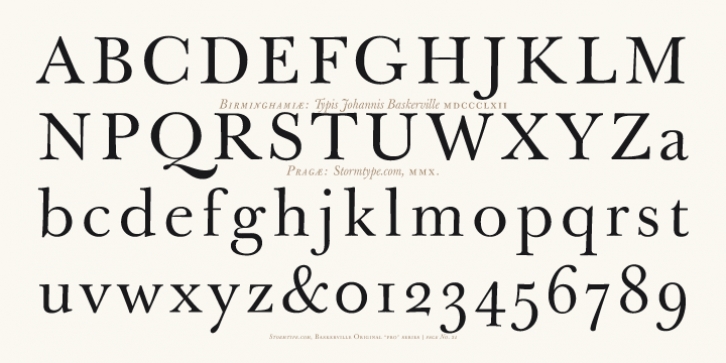
Thursday, February 12
A Curated Gallery of Beautiful Fonts for Creative Designers
39,832 Premium Fonts

Thursday, February 12
A Curated Gallery of Beautiful Fonts for Creative Designers
39,832 Premium Fonts


 Until recently the story of this typeface ended with mediocre digital versions, which did not get at the root of its inspiration. Our pursuit of this paramount body typeface of the 20th century began in Nové Hrady Castle, the place where a part of the depository of old prints of the National Museum Library is kept, in the summer of 1999. Thanks to the understanding of the librarian Petr Mašek we were allowed to study and photograph four rare volumes from Baskerville’s printing office, dating from about 1760. We selected as the most successful models for the digitization of this typeface its Roman and italics in the size of about today’s 14 points, which Baskerville used for the printing, among other things, of his folio Bible in 1763 and Vergil’s works in Latin in 1757. These were large-size, stately prints on paper smoothed out by hot copper calender rollers. When composing the pages, Baskerville emphasized the importance of the blank space, just as the effect of the majestic austerity of the setting, which became an inspiration for Neo-classical typographers. He strove to remove everything which obstructs legibility, working without ornaments and rules, neatly, and with large margins. He proceeded along these lines also when designing his new typeface. His punchcutter John Handy was given the task to make the typeface different from the then fashionable Caslon, which was a surprise for a certain part of typophiles of the period. Baskerville perhaps anticipated certain elements known from Bodoni and Didot, which is why nowadays everybody calls it a “transitory” phenomenon. A detailed evaluation of Baskerville’s heritage, however, remains a task for historians. Our analytical transcription enhances rather the artistic and visual qualities of his typeface.
Until recently the story of this typeface ended with mediocre digital versions, which did not get at the root of its inspiration. Our pursuit of this paramount body typeface of the 20th century began in Nové Hrady Castle, the place where a part of the depository of old prints of the National Museum Library is kept, in the summer of 1999. Thanks to the understanding of the librarian Petr Mašek we were allowed to study and photograph four rare volumes from Baskerville’s printing office, dating from about 1760. We selected as the most successful models for the digitization of this typeface its Roman and italics in the size of about today’s 14 points, which Baskerville used for the printing, among other things, of his folio Bible in 1763 and Vergil’s works in Latin in 1757. These were large-size, stately prints on paper smoothed out by hot copper calender rollers. When composing the pages, Baskerville emphasized the importance of the blank space, just as the effect of the majestic austerity of the setting, which became an inspiration for Neo-classical typographers. He strove to remove everything which obstructs legibility, working without ornaments and rules, neatly, and with large margins. He proceeded along these lines also when designing his new typeface. His punchcutter John Handy was given the task to make the typeface different from the then fashionable Caslon, which was a surprise for a certain part of typophiles of the period. Baskerville perhaps anticipated certain elements known from Bodoni and Didot, which is why nowadays everybody calls it a “transitory” phenomenon. A detailed evaluation of Baskerville’s heritage, however, remains a task for historians. Our analytical transcription enhances rather the artistic and visual qualities of his typeface. 
